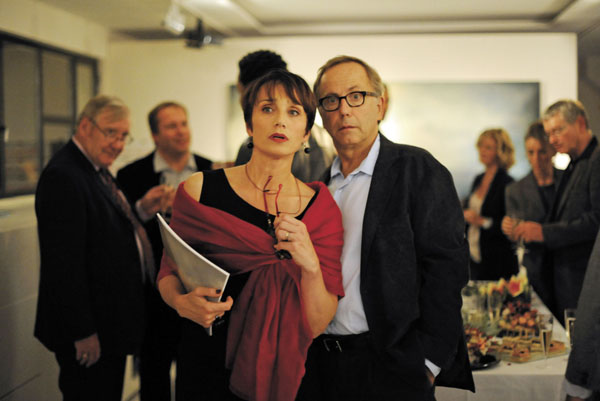On Thursday, we learned that François Ozon’s Jeune et Jolie (Young & Beautiful) will premiere in Competition at Cannes next month. As it happens, the film Ozon completed last year is now seeing a limited release in the States, following a nice little run in the UK at the end of last month.
“Making his breakthrough works at the tail end of the New Queer Cinema,” writes Melissa Anderson for Artforum, “François Ozon was once devoted to charting psychosexual extremes in movies like See the Sea (1997), Criminal Lovers (1999), and Water Drops on Burning Rocks (2000). But after the prolific director’s masterful study of grief, Under the Sand (2000)—a film that revived Charlotte Rampling‘s career—Ozon has too often toggled between kitsch misfires (2002’s 8 Women, 2010’s Potiche) and projects weighed down by long, inert melodramatic passages (2005’s Time to Leave, 2009’s Hideaway). Liberally adapted from Juan Mayorga’s play The Boy in the Last Row…, In the House, at first suggests a return to the anarchic adolescent protagonists of his early films, whose uncontrollable desires were inextricably linked with destruction and mayhem.” Instead, “Ozon has followed a clear trajectory: from épater to embrasser le bourgeoisie.”
But Nick Dawson, introducing an interview with Ozon for Filmmaker, argues that In the House “sees him returning to provocative territory, but with a sophistication and restraint he lacked in the early days of his career. Jaded high-school teacher Germain (Fabrice Luchini) is revitalized by one of his literature students, Claude (Ernst Umhauer), when he shows some talent by writing about his attempts to insert himself into the life and, yes, the house of a fellow classmate, Rapha (Bastien Ughetto). Claude, encouraged by his teacher to ‘push the narrative forward,’ further ingratiates himself with Rapha and his family (and Rapha’s comely mother, played by Emmanuelle Seigner), all the while blurring the line between reality and fiction. While most directors would take the action into well-trodden psychological thriller territory, Ozon wittily plays with the tropes of the genre but ultimately focuses more on the complex game being played by student and teacher.”
In the House, which scores an A- from Noel Murray at the AV Club, “is playfully meta-textual, as Ozon asks viewers to question what’s actually a part of Umhauer’s story, and what he’s just making up to please his mentor. It isn’t easy to blend reality and fiction in this way, but Ozon… finesses the trick by filtering everything through the perspective of Luchini, who doesn’t care much about what’s true and what Umhauer is just concocting…. All the way up to the stunning final shot, Ozon urgently asks whether, for storytellers, it’s better to be on the outside looking in, or the inside looking out.”
“Luchini is France’s master of deadpan comedy,” writes Ella Taylor for NPR. “When he does farce, it carries an undertow of sorrow, and vice versa. [Kristin] Scott Thomas, too often unimaginatively cast as sour or depressed viragos, holds her own beautifully as the vinegary, ambitious Jeanne…. So everyone in this movie is plausible. But are they real, or figments of a budding writer’s hungry imagination, fed by an enabler with his own unacknowledged desires? A blizzard of multiple perspectives and tonal shifts is set off by Philippe Rombi’s lovely score, by turns exuberant, ferocious and wistful.”
“Ozon champions the construction of his script over the plausibility of his characters, making In the House more of a successful experiment than a scintillating portrait,” writes Nick McCarthy in Slant. “It’s buoyant and titillates, striking that distinctly Ozonian balance between the beautiful and the sinister, but it doesn’t resonate.”
“In the House satirizes the process of aesthetic creation and the damage it can cause both the artist and those around him,” argues Jared Eisenstat, writing for Film Comment. “He may feign sympathy for the middle-class family, but one senses that underneath it all, like Claude and Germain, Ozon still struggles to transcend his contempt toward the normal.”
But the New York Times‘ A.O. Scott finds that “the dexterity of the actors and their director is not quite enough, and as In the House accelerates, it also starts to sputter, piling on incidents and revelations that cause its web of implications to unravel.” More from Dustin Chang (Twitch) and Beth Hanna (Thompson on Hollywood).
More interviews with Ozon: Film.com, Susan King (Los Angeles Times), Peter Knegt (Indiewire), and Carl Swanson (New York). Sam Adams talks with Kristin Scott Thomas for the AV Club.
Updates, 4/21: Michael Guillén finds that In the House “attempts to fuse too much together and reveals its processes of fusion way too willingly. Just when you’re starting to invest in the characters, they start dalliancing around the script itself, pulling down the fourth wall in a staged-as-sophisticated but increasingly disingenuous manner that left me dissatisfied and put off by film’s end.”
And Steven Erickson talks with Ozon right here in Keyframe.
Update, 4/29: “The most urgent debt here,” suggests Anthony Lane in the New Yorker, “is to Céline and Julie Go Boating, the Jacques Rivette film in which two young women keep entering a house of mystery and staggering out again, a while later, as if high on pure narrative.”
For news and tips throughout the day every day, follow @KeyframeDaily on Twitter and/or the RSS feed. Get Keyframe Daily in your inbox by signing in at fandor.com/daily.




